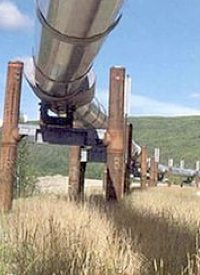
Environmental contention stirs as discussions cultivate over the long-delayed 1,700-mile Keystone XL pipeline, which would transport Canadian crude oil from the Athabasca Oil Sands in northeastern Alberta, Canada, to southern parts of the United States. Due to environmental concerns, lawsuits from oil refineries, and opposition in the U.S. Congress, the project has been on hiatus, as it lingers in the State Department’s permitting process, awaiting President Obama’s approval.
In urging the President to act, Republicans and business leaders allege that the $7 billion expansion will create 20,000 jobs — 13,000 construction jobs and 7,000 manufacturing jobs — and ease U.S. dependence on foreign oil. TransCanada, the Canadian company that proposed the expansion, estimates that the pipeline would deliver over one million barrels of oil a day to the U.S. “We could help reduce the amount of imports from the Middle East,” asserted TransCanada spokesman Terry Cunha, “which would ensure energy security for the United States.”
Over the years, the pipeline has endured intermittent delays, as it was originally proposed on February 9, 2005. Permission from the U.S. State Department was granted in 2008, and the first phase was completed in 2010. The second phase connected two pipelines to Steele City, Nebraska, and the third phase, known as Keystone XL, will build extensions to the north and south, granting passage for oil from Alberta all the way down to Texas. The third phase is still awaiting approval from the Obama administration, but if approved, TransCanada says the pipeline will be fully operational by mid-2013.
After speaking to Canadian Foreign Affairs Minister John Baird last week, Secretary of State Hillary Clinton said they are waiting for the State Department’s environmental review and a final decision will be made by the end of the year. “We’ve been clear from the beginning that the safety of the pipeline is one of our highest priorities … We are leaving no stone unturned in this process,” Clinton pledged. “We have worked diligently to make sure that we have full understanding of all of the consequences, including the very important point that the minister made to me about energy security and what that means for our two countries.”
Baird said his 45-minute meeting with Clinton turned out to be a “good discussion,” and that she seemed to be receptive to “Canada’s case.” He stressed that the question is not so much the source of the oil, but the safety of the pipeline itself. In the meeting, Baird emphasized that Canada is a “trusted partner” and a “safe and secure liberal democracy,” obviously implicating the ethical perks of importing oil from Canada rather than hostile and unstable countries like Libya and Saudi Arabia.
The Washington Times reported on the status of the State Department’s environmental review:
The State Department is wrapping up the last stages of its review and is expected to release its final environmental impact statement this month. The first two reviews seemed to favor the project, but the EPA has protested, so business groups are waiting to see how that affects the last report.
After the report is released, the State Department will have a 30-day comment period, when it will hold nine public hearings at locations near the pipeline. At the same time, it will have a 90-day comment period from relevant federal agencies, such as the EPA, the Energy Department, the Interior Department and the Pipeline and Hazardous Materials Safety Administration.
Many of the pipeline’s delays are due to political opposition, pressure from environmental groups, and citizens concerned about eminent domain — not to mention, opposition from across the border. In October 2007, the Communications, Energy and Paperworkers Union of Canada requested that the Canadian government block regulatory approvals of the pipeline. Skeptical of mutual benefits for the Canadian people, the union’s president stated, “The Keystone pipeline will exclusively serve U.S. markets, create permanent employment for very few Canadians, reduce our energy security, and hinder investment and job creation in the Canadian energy sector.”
Environmentalist groups express concern that the pipeline could pollute air and water supplies, as well as harm animals and wildlife. Two areas of particular concern are the Sandhills in Nebraska, a wetland ecosystem, and the Ogallala Aquifer, one of the world’s largest fresh water reserves. Environmentalists suggest a leak could be devastating for the environment. “The fact is that pipelines leak,” said Harlan Hentges, executive director at the Center for Energy Matters. “If you got one, it’s going to leak. The only question is when.”
The Dirty Oil Sands network, a vocal opponent of the pipeline, says Alberta oil, known as “tar sands oil,” is the “world’s most harmful type of oil for the atmosphere, emitting high volumes of greenhouse gases during development, which contribute to global warming.” The network believes tar sands oil is the dirtiest type of oil in the world and that it emits three to five times more so-called greenhouse gas pollution than regular oil.
TransCanada and supporters of the pipeline say leaks do occasionally occur but are rarely severe and easily manageable. Proponents argue that the benefits would profoundly outweigh the costs, which are already minimal. The project would significantly reduce U.S. dependence on Mideast oil, as it would double the capacity of an existing pipeline from Canada. And if the Keystone XL pipeline is not built, TransCanada argues, it would mean more Canadian oil exported to China and other countries.
Proponents further contend that completion of the pipeline is imperative for U.S. economic growth, as it will create thousands of jobs and help lower gas prices in a country that consumes far more oil than it produces. And though the pipeline would not be fully operational until 2013, supporters suggest that the mere perception of supporting U.S. energy independence will lower oil prices in the short-term.
What it will likely come down to is Obama’s political image and his loyalty to the EPA and the environmental agenda. But with gas prices at unprecedented heights, opposition from environmentalists might be trumped by Obama’s thirst for a 2012 reelection. After all, $4 a gallon gasoline is not exactly voter-friendly.


